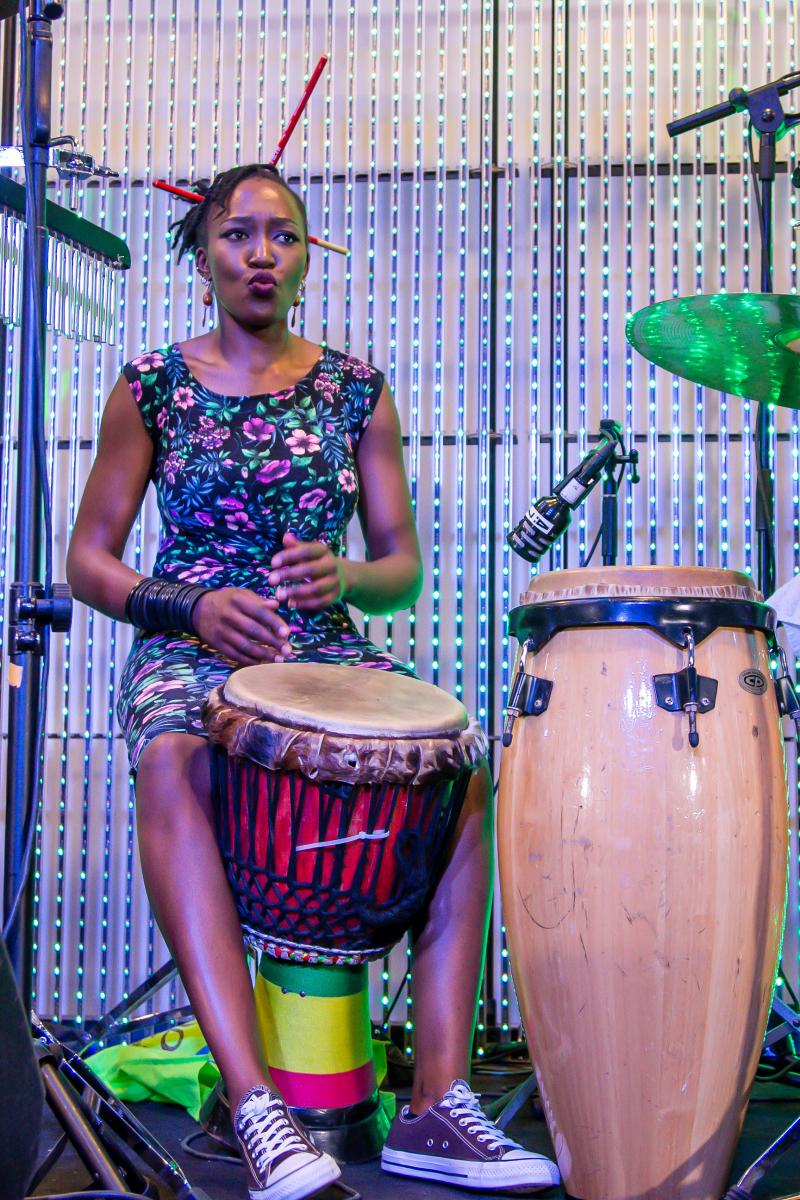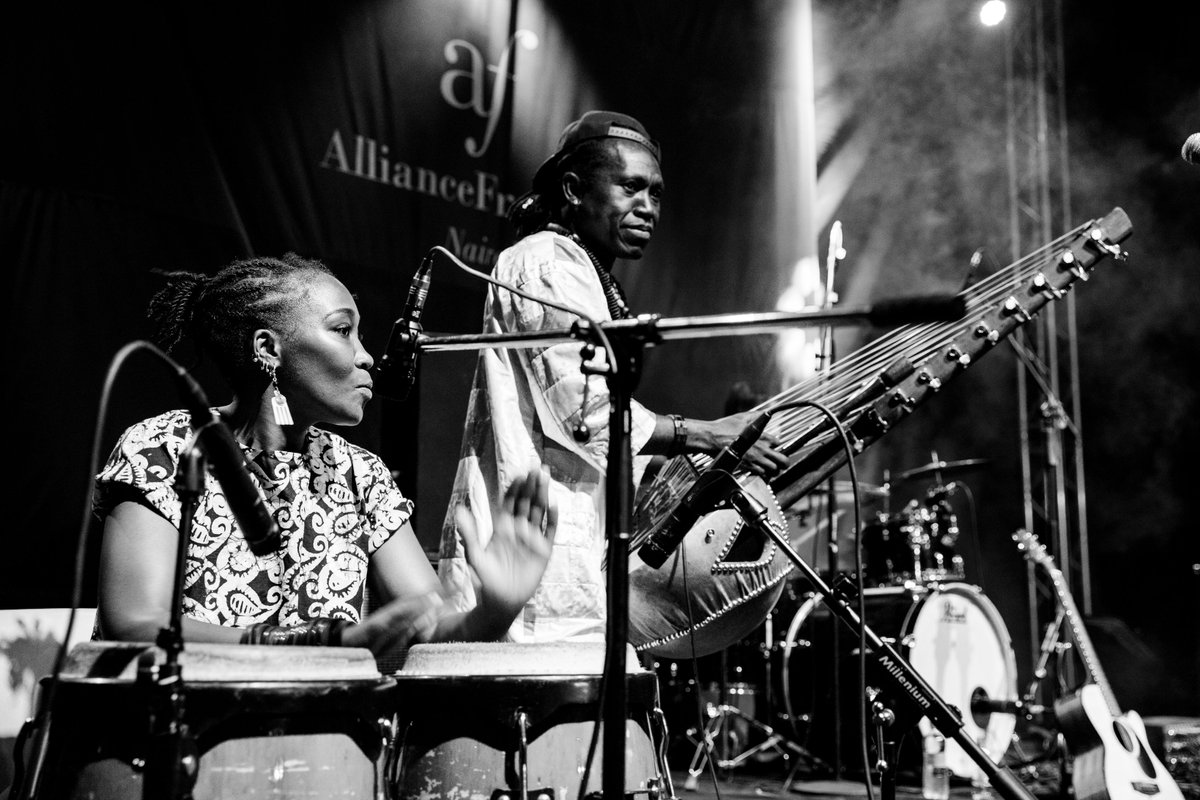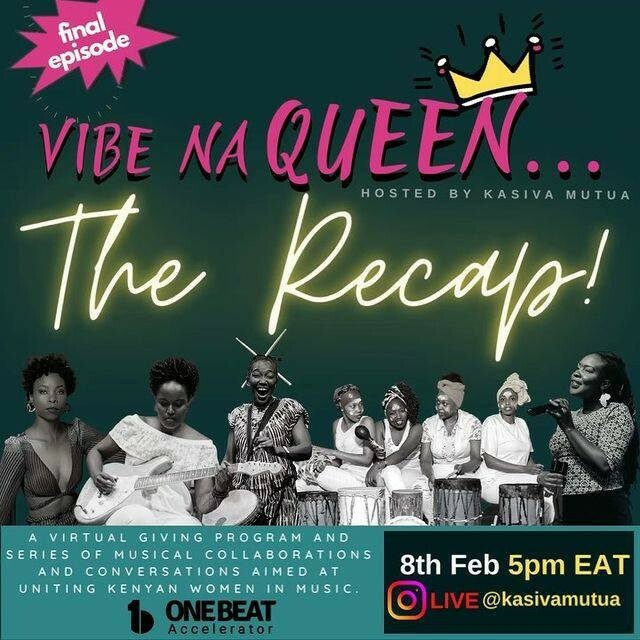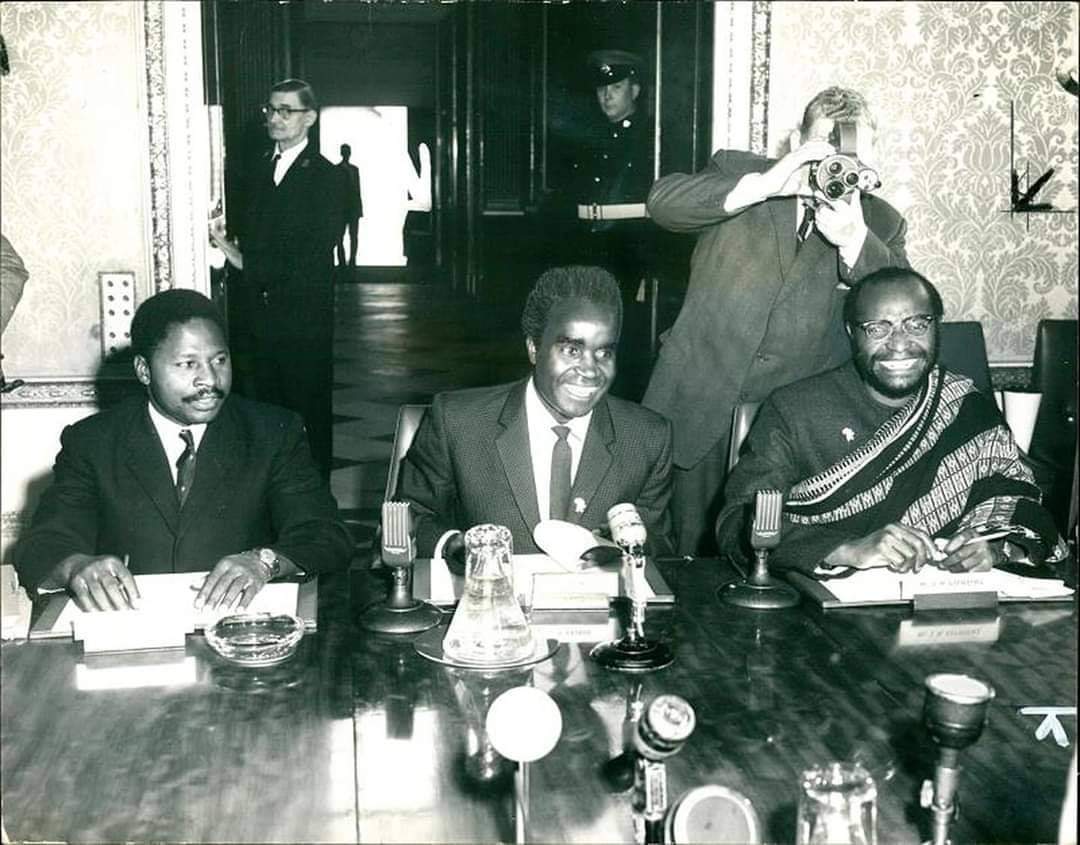
KASIVA MUTUA
Me & My Drum, Telling my Story
If you’re having a bad day, listening to Kasiva’s drums might just be what the doctor ordered. It’ll perk you up.
Me & My Drum, Telling my Story
If you’re having a bad day, listening to Kasiva’s drums might just be what the doctor ordered. It’ll perk you up.

You will agree that drums do indeed create their own ecosystem. It’s almost like that one experience with Bose speakers’ 360o surround system. When Kasiva plays, the beauty ultimately lies in the eyes-and ears of the beholder. The happiness, the glee, the mirth. The gaiety. 

The closest your mind can get to those Mindvalley-altering states of consciousness is maybe having a listen to Kasiva’s drums.
And the smile. The smile will charm you through her performance like a flute would hypnotize a snake out of its holding basket, as if drawn by the flute’s tune. It’s been remarked that no one seems happier when performing on stage with her drum set than Kasiva does.
She has perfected her craft to include her expressions which are now a staple of her stage performance.
Oh, the expressions! Kasiva’s expressive style of performance is quite unique. It adds to the tempo of the beats as the expressions help the drums tell the story. Kasiva’s expressions are out of this world-the smile, the giddy cheekiness, the element of surprise and on and on.
So how come many Kenyans are hearing of Kasiva Mutua for the first time now, post Covid-19 lockdown? To be honest, our team liked Kasiva’s vibes on Coke Studio but had no idea how good she was; phenomenally, amazingly, world-class, ‘Africanacity’ good.
Coke studio is the TV music-production show that brings together musicians from Africa to produce music in a collaborative atmosphere while showcasing African musical talent. Kasiva is a resident percussionist on Coke Studio.
Her performance can induce one into a trance like those Mindvalley videos profess to.
Mindvalley
In between listening to the Talking Drums, a Mindvalley video may pop up on YouTube. Less of an irritant but borderline intrusive, the inner ear sounds of curiosity will keep you tuned in while a part of you is tempted to skip the ads.
In between listening to the Talking Drums, a Mindvalley video may pop up on YouTube. Less of an irritant but borderline intrusive, the inner ear sounds of curiosity will keep you tuned in while a part of you is tempted to skip the ads.
So, you listen on. There are three states of altered consciousness.
The Mindvalley gurus will tell you what they are and then walk you through which phase you’re in. You hear Alpha, Beta, Delta. The mind being of such short memory, you only remember, the last one, Delta-D is for Drums.
Then you get distracted because Kasiva’s drums are beating in your head and you can literally listen to the beats in your heart. This is quite some good stuff oozing through the borrowed but soon-to-be-returned Bose earphones.
The energy in the music is enough to last one a lifetime.
Never mind that in your lifetime your heart will have beaten about 2.5 billion times.
That’s plenty of beat counts-even for a professional drummer.
That’s plenty of beat counts-even for a professional drummer.
Taboo
In the majority of African cultures, women were not allowed to play drums. Kasiva remembers the painful times when she has been considered “loose” and “dirty” because of being a percussionist.
In the majority of African cultures, women were not allowed to play drums. Kasiva remembers the painful times when she has been considered “loose” and “dirty” because of being a percussionist.
A good number of reasons for not letting women play are predicated on the attitudes about the female body and most such reasons pretty much originated from a patriarchal tradition.
These cultural justifications are almost always enforced (and reinforced) by the traditionally appointed custodians of culture-men.
How do you think you look with the drums between your legs?
Seriously. Misogyny will follow one to places you’d never even imagine. On stage. That’s one of the questions a male attendee asked during one of her local concerts. Like seriously.
Seriously. Misogyny will follow one to places you’d never even imagine. On stage. That’s one of the questions a male attendee asked during one of her local concerts. Like seriously.

Would such a question have been asked of a male drummer?
It would be akin to asking a mechanic, male or female; “How come you have to go under the hood of a car dressed like that and maintain a decorous position?”
You have to wonder sometimes how some people can have the gall to accuse others of impropriety when they themselves might well be-
From journalism beat to the beat’s rhythm.
Like most societies, education is put on a pedestal in Kenya and a premium is placed on not only how educated one is but follows a food chain that reeks of colonial mentality.
Like most societies, education is put on a pedestal in Kenya and a premium is placed on not only how educated one is but follows a food chain that reeks of colonial mentality.

The higher up the food chain, the more privilege and status that society accords one.
Medicine, law, and engineering courses were the dream courses for the creme de la creme of society, maybe still are.
Even in the field of medicine surgeons are considered or rather consider themselves as ‘“gods” of medicine and GPs (General Practitioners) rank much lower in the food chain of the healing universe.
Even universities abroad are not spared this stratification. If you have Kenyan friends of South Asian origin, they will tell that joke that so and so went to Harvard in Washington DC. We all know too well that Harvard is in Cambridge Massachusetts.
What Daddy Patel meant to say was Howard. Howard with a ‘w’.
There is a Historically Black College & University (HBCU) in Washington DC called Howard University, Kamala Harris’ alma mater and the oldest black university in the United States. So much for Harvard and Howard like wewe and veve. Sava? Ha!
Despite all the cajoling and ridicule Kasiva has suffered because of being a percussionist, she continues to ply her trade of talking to her drums and what a ride it has been. A graduate of journalism school, Kasiva followed her passion and elected to be a percussionist.
It was a calling,she says, like one is called into the priesthood. Those attitudes notwithstanding, she has cut a unique niche for herself, being the only female professional percussionist in Kenya.
Spoons, plates and drums.
As a young child, Kasiva would listen to grandmother’s stories and make up for the interludes in the stories with a plate and spoon in hand.
As a young child, Kasiva would listen to grandmother’s stories and make up for the interludes in the stories with a plate and spoon in hand.
Then, with her tiny little hands, she would beat her chest to keep the tempo. And the beat would keep going and going.You just couldn’t stop the beat.
Those tiny little hands beating the make-believe percussion have now taken her to world capitals and festivals overseas where she plays with the latest cutting-edge set of percussion instruments available. 

Kasiva would then feel the rhythms forming in her head ready to fill in the gaps between the stories. Grandma’s voice would go in tandem with the sounds in Kasiva’s head. Little Kasiva would listen to the wind blow giving way to the river’s flow.
Symbols would go with the cymbal.
Tangerines tumbling down would suddenly give way to the sound of the tambourine.The buzz of the beetle rolling in dung would often go with the bass line and so on.
African Heritage
Drumming encompasses many aspects of African culture. Childbirth punctuated with initiation ceremonies, homecomings,welcomings, homegoings/farewells and even burials. The whole spectrum of life.
Drumming encompasses many aspects of African culture. Childbirth punctuated with initiation ceremonies, homecomings,welcomings, homegoings/farewells and even burials. The whole spectrum of life.
Playing of the drum is an integral part of our culture and Kasiva hopes to preserve this fast-disappearing facet of African culture. 

Intercultural:Brasil Samba
With the interconnection of the African culture both on the continent and in the diaspora, you will find brilliant female percussionists in places like Rio de Janeiro.
With the interconnection of the African culture both on the continent and in the diaspora, you will find brilliant female percussionists in places like Rio de Janeiro.
Brazil after all has the second largest population of black people in the world after Nigeria. A 2010 census identified 91 million Brazilians as being of African descent.
It would make perfect sense for Brazil to have a top-notch group of female percussionists, being such a progressive country.
Marcia Viegas is one of the top percussionists of the Samba genre or the Brazilian Pagode, a subgenre of the Samba where the people sing in a chorus and enjoy the sense of community with plenty of food, music, dance and party. Marcia is always sought after all year round.
Disappearing Drum
Sadly, the drum is disappearing fast from the retinue of African instruments that is played popularly in Kenya. Kasiva is doing her part to preserve this tradition by teaching the art of drumming to young boys, girls and groups of women.
Sadly, the drum is disappearing fast from the retinue of African instruments that is played popularly in Kenya. Kasiva is doing her part to preserve this tradition by teaching the art of drumming to young boys, girls and groups of women.

Fear
In her journey as a percussionist, Kasiva has met many women who want to play the drum but there is one thing keeping them away. Fear. They fear how society will perceive them if they were to play the drum.
In her journey as a percussionist, Kasiva has met many women who want to play the drum but there is one thing keeping them away. Fear. They fear how society will perceive them if they were to play the drum.
It may be the physical pain that comes with playing. Others, well, the spouses won’t approve of them playing simply because of tradition.
By overcoming these fears then will we preserve our African heritage and help maintain our culture.
Courage
Kasiva has a lot of admiration for her role model, the incomparable Bi Kidude from Tanzania. Bi Kidude, the enigmatic Queen of Taarab music was one of the first Zanzibari women to sing in public.
Art: @AnthonyKipngen3
Kasiva has a lot of admiration for her role model, the incomparable Bi Kidude from Tanzania. Bi Kidude, the enigmatic Queen of Taarab music was one of the first Zanzibari women to sing in public.
Art: @AnthonyKipngen3

Bi Kidude made a bold statement regarding the liberation of the African woman by that very bold act of singing in public.
Taste the feeling
And like with the good ol’ Coke commercial, when you’re up and about in the ‘City in the Sun’ and the scorching sun is high up at noon and you want to quench your thirst, you’ll remember the feeling at the eatery.
And like with the good ol’ Coke commercial, when you’re up and about in the ‘City in the Sun’ and the scorching sun is high up at noon and you want to quench your thirst, you’ll remember the feeling at the eatery.
Flowing down the parched throat, the tingling fizz washing down the chicken drumsticks, like Coke Studio's drink of choice will remind one to taste the feeling-of the drums (and sticks).
Recap
After you’re done with the chicken drumsticks, somewhere on a footbridge’s stairs in the suburbs, you lift up your head in the air to see the billboard stab the air, as the image of Kasiva with drum sticks stuck in her hair seems to glare.
After you’re done with the chicken drumsticks, somewhere on a footbridge’s stairs in the suburbs, you lift up your head in the air to see the billboard stab the air, as the image of Kasiva with drum sticks stuck in her hair seems to glare.

Even as you tilt your head up in the air to hear the magical drum, beats still flare-the music. After gulping down the drink of Cola, a burp, then you exclaim, Yeah! Taste the feeling. Get the feeling?
• • •
Missing some Tweet in this thread? You can try to
force a refresh







